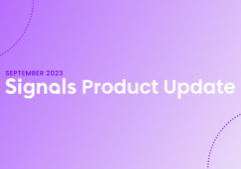Qualifying leads effectively is a cornerstone of building a solid sales pipeline and securing more deals. Today, we delve deeper into the art of sales qualification, enhancing our guide with the integration of Data Enrichment, Smart Marketing tactics, and the power of Real-Time Tracking.
The Critical Role of Sales Qualification
Focusing on the most promising leads is crucial, more so in today’s Smart Marketing era. Qualifying leads with Data Enrichment allows you to identify those who are not just likely to convert but are a perfect match for your ideal customer profile. This strategic focus prevents the squandering of time and resources on less promising prospects, ensuring your sales efforts are both efficient and effective.
Moreover, utilizing Smart Forms and Smart Bots in your qualification process can significantly enhance your understanding of customer needs and pain points, enabling you to tailor your sales pitches more effectively.
Elevating Lead Qualification: 7 Pro Tips
#1 Understand Your Ideal Customer with Data Enrichment
Utilizing Data Enrichment helps paint a clearer picture of your ideal customer, identifying their demographics, pain points, and buying habits. This insight is invaluable for qualifying leads more precisely.
#2 Leverage a Lead Scoring System with Smart ID
Implementing a lead scoring system that incorporates Smart ID technology allows for a nuanced evaluation of a lead’s potential based on specific criteria, such as engagement with your brand and their position within the company.
#3 Craft Smart Questions Using Smart Forms
Harness the power of Smart Forms to ask probing questions that reveal the lead’s true needs, challenges, and decision-making process. This tailored approach ensures you gather the most relevant information to qualify leads effectively.
#4 Engage in Active Listening Supported by Smart Bots
Utilize Smart Bots to engage with leads actively. These bots can capture critical information during interactions, which can then be used to fine-tune your sales approach.
#5 Employ Technology for Real-Time Tracking
Technologies that offer Real-Time Tracking enable a more dynamic lead qualification process, allowing for adjustments based on live data and engagement patterns.
#6 Apply Sales Qualification Frameworks with Account Identification
Familiarize your team with various sales qualification frameworks, utilizing Account Identification to ensure a consistent and informed approach to evaluating lead readiness.
#7 Ensure Timely Follow-Up with Smart Alert
Utilize Smart Alert notifications to stay connected with qualified leads. This ensures you remain top of mind and can significantly increase the likelihood of closing the deal.
Why Sales Teams Must Prioritize Lead Qualification
By focusing on leads that are not just ready to buy but are also a perfect fit for your product or service, sales teams can significantly increase their efficiency. Incorporating Account Intelligence into the qualification process allows for a deeper understanding of customer needs and behaviors, leading to more successful sales strategies.
Elevate Your Lead Qualification with Signals
Signals boosts your lead qualification efforts by providing real-time insights and intelligence, thanks to our Data Enrichment capabilities. By identifying key characteristics of your ideal customer, Signals enables more precise lead qualification, ensuring your team focuses on the most promising prospects.
Don’t let unqualified leads divert your sales team’s efforts. Discover how Signals can refine your qualification process, bolster your sales performance, and transform your approach to lead management. Click for a personalized demo and unlock the full potential of Smart Marketing and Data Enrichment today!
READ MORE
Start seeing your Buyers' signals
Signals is helping companies automate, grow, and close sales pipeline with industry-leading predictive intent scoring, lead generation, and real-time engagement.






















